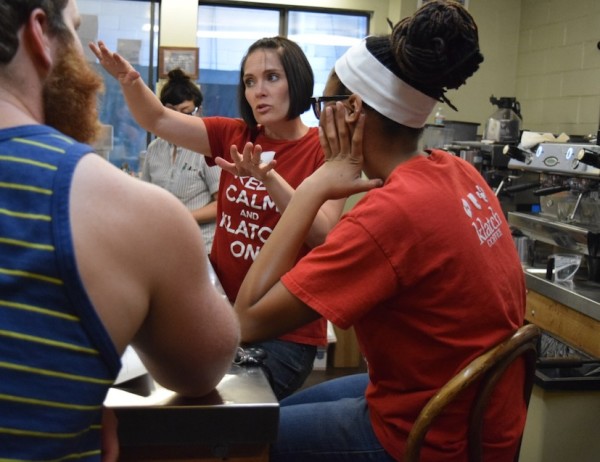by Heather Perry of Klatch Coffee and Klatchology
Much of my job involves training, and in my experience, training elements fall into one two categories: practical and emotional. This two-part training series will look at my five tips for being a great trainer in each category. Let us start with the practical side:
Know the rules and the expectations
Whether you are training someone for a competition, training a wholesale account or training someone to work retail, always be clear about what are the final expectations. Some people walk into training and expect to walk out a champion a day later. It is important to know what people’s expectations are and define the rules that can lead to meeting those expectations. If training for a competition, the rules are listed — you need to make sure you work within them if you want to do well. But even in training for retail, there are unwritten rules that still must be followed if you want to achieve success.
Teach the why along with the fundamentals
I find people always do better when they understand why I am having them do things certain ways. Even if it complex, I always start with theory. One example is something simple like flushing the grouphead. If I tell someone to make sure they flush it, they may or may not remember. But if I go over the impact on taste on the why behind flushing, I find people are much more receptive. Something more complicated may be how a doserless grinder works. Some people just teach adjusting the grind and never address the dose, but I don’t let people pull shots until they understand the relationship between grind and dose and how they each affect taste. It’s a lot to take in, but that’s why you teach one topic at a time, allowing people to fully understand the why.
Repetition
Some things simply require repetition, and you need to allow time for that. For instance, with tamping, set aside enough time to allow people to get comfortable. If you skimp on getting the simple things right, you will limit your trainee’s ceiling. I work with people when training for competitions and everyone wants to immediately jump right into the big stuff, even when they can’t adequately execute the basics.
Practice does not make perfect
Now I know I just said repetition is important, but only if it is being done correctly. A good trainer is not just a cheerleader who encourages, but someone who is willing to correct people when they are doing something wrong and give them the necessary advice to correct the problem. Ensure that repetition is monitored for quality.
It’s all about the taste
For me, coffee training of any sort is all about the taste. If you don’t understand what you taste and how to manipulate that taste, then it doesn’t matter how much work you are doing — you are, to some extent, a button pusher. The mechanics of espresso and coffee for me are fairly simple, but to understand what you taste and to identify those tastes, that is the real art, and something that can’t be achieved without comprehensive and thorough training from the bottom up.
Heather Perry
Heather Perry is the Vice President and Director of Training and Consulting for Klatch Coffee, a 20-year-old Los Angeles based roaster and retailer. She is a four-time U.S. regional barista champion, a two-time United States champion, and placed second at the Barista World Championships in 2007. She is also the past chair of the Barista Guild of America, where she helped to design and launch their certification program.











Comment